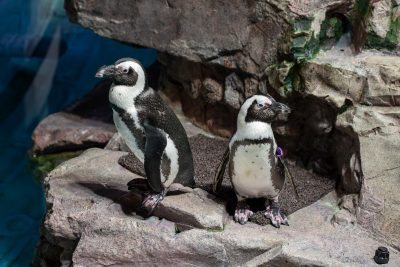Humans aren’t the only species who need a retirement plan. But for African penguins, that plan doesn’t include a 401(k).
The New England Aquarium created a new “retirement home” island in its penguin colony to provide comfort and specialized care to African penguins, a “critically endangered” species, as they age beyond their expected lifespan.

“As a non-releasable group of birds that are here for conservation reasons, it’s really important that they still have the opportunity to showcase all these natural behaviors and carry those out,” said Mia Luzietti, a penguin trainer at the New England Aquarium.
The New England Aquarium’s penguin exhibit consists of many islands, where birds anywhere from 10 months to 35 years old coexist, Luzietti said.
The Animal Care team chose a flatter island that was furthest from the rest to designate as the retirement home, Luzietti said.
The average lifespan of an African penguin in their natural environment is 10 to 15 years. Luzietti said more than half of the Aquarium’s birds are in their 20s or 30s, showing how long they could live in an “optimal” environment.
As they age, African penguins are prone to ailments such as cataracts and arthritis, which would hinder their ability to compete for survival in their natural environment, Luzietti explained.
Another key feature is the excess matting distributed on the island, which is easier on the penguins’ joints and feet. Penguins are prone to pododermatitis, or bumblefoot, which result in calluses and inflammation on the penguins’ feet.
“We want to make sure that they’re not dealing with harder to climb islands or competition from younger, spunkier birds that might be a handful at feeds,” Luzietti said.
Six penguins were initially moved to the retirement home: Boulders, Lambert, Harlequin, Durban, Isis and Dyer. The penguins were chosen for the new island based on physical, social or behavioral challenges the team saw or expected to see, Luzietti said.
At the aquarium, penguins receive voluntary eye drops, cataract surgery, foot care and other treatments.
Luzietti said the aquarium has a high focus on “individualized, preventative care,” and the trainers all have different relationships with the penguins.
She said the birds have strong boundaries and can be “picky” with the trainers. One penguin, named White Black for the countershading on her back and stomach, is attached to Luzietti.
“I’m the only one she follows in the exhibit, and she actually tries to climb me as if I am an island,” Luzietti said. “I thought that’s how she was, but nope. That was her saying, ‘Hey, I really like you. I want you to be my person,’ and that’s been really reinforcing for me.”
The New England Aquarium is part of the Association of Zoos and Aquariums’ Saving Animals From Extinction program for African penguins, which connects more than 50 AZA-accredited zoos and aquariums to save the species from extinction.
Jen Kottyan, bird coordinator for Maryland Zoo with the largest African penguin breeding facility in the U.S., is the program leader for the AZA’s African Penguin Species Survival Plan.
“There is less fish for them to eat, which means they’re having to swim further and further out to find food,” Kottyan said. “They have less food to feed their young because they’re burning off all those calories that they need swimming back and forth.”
Collection management efforts by AZA-accredited institutions go toward genetic research to keep the species alive, said Maryland Zoo Spokesperson Mike Evitts.
“We’re literally trying to keep these animals going as a species on this planet, with the hope that we can begin to repopulate their natural territory at some point down the road,” Evitts said.
Kottyan said collection management efforts for the endangered African penguins could aid in rehabilitation and reintroduction efforts using the eggs produced by captive penguins.
For the New England Aquarium, the current goal remains providing comfort and specialized care to its aging penguins, Luzietti said.
She said the team may move more birds to the isolated island in the future, but they are mindful about introducing new birds to the social dynamic given African penguins’ territorial nature.
The aquarium’s oldest penguin, 35-year-old Good Hope, is not on the geriatric island because he is a “strong force” in the colony, Luzietti said. Good Hope may move to the island after the other six penguins acclimate.
The New England Aquarium’s new “retirement home” island is “calling attention to the well-being of animal care under management,” Evitts said.
Kottyan said collection management efforts like those with African penguins are why zoos and aquariums matter.
“We’re trying to stop the extinction of a lot of animals, and African penguins are one of them,” Kottyan said.
Given the open nature of the New England Aquarium’s penguin exhibit, the public will notice the separation of the geriatric island. Luzietti said it may be difficult to answer questions about “the science versus how it’s perceived,” but she is ultimately proud of the aquarium’s transparency with visitors.
“We are public all the time and having guests see that and be able to ask questions is really rewarding for me,” Luzietti said. “When I was growing up, I didn’t know all of the amazing conservation and individualized care zoos and aquariums were providing.”






















































































































